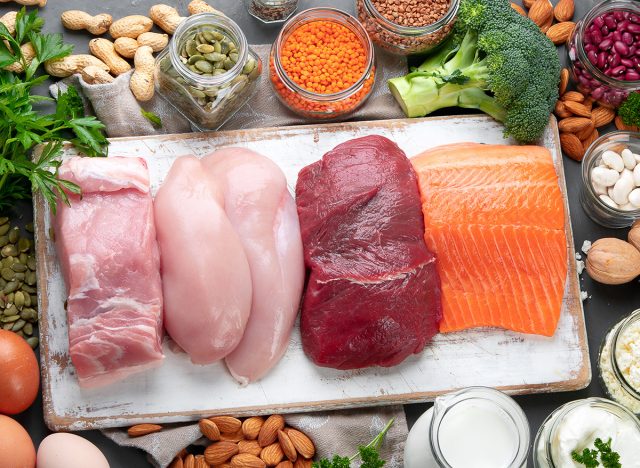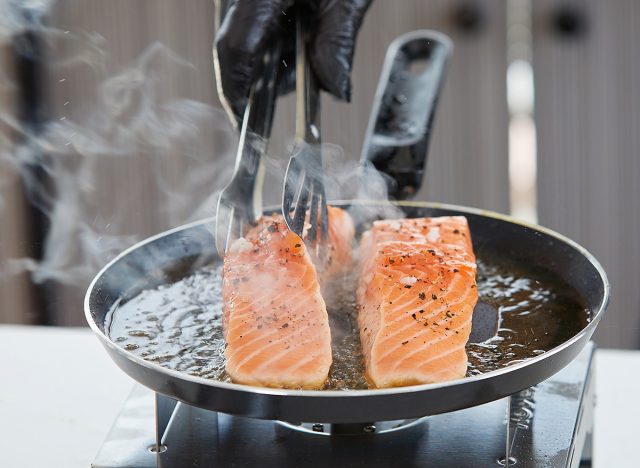5 Ways to Speed Up Your Metabolism
Do you feel like your metabolism has slowed down or plateaued? There are things you can do to speed it up, according to an expert. Nicole Bauserman is a woman's metabolism and fitness coach whose goal is "helping women build fast metabolisms + strong bodies, so they can drop fat for good." In a recent series of viral Instagram videos she addresses a question from one of her followers: How do you "heal" your metabolism? Here is exactly what you need to do, according to Nicole. Body Network's Resident RDN, The Diet Diva, Tara Collingwood, MS, RDN, CSSD, LD/N, ACSM-CPT, a Board Certified Sports Dietitian, co-author of the Flat Belly Cookbook for Dummies, also weighs in on her strategies.
Your Metabolism Has Likely "Adapted to Your Lifestyle"

"So if you are feeling this way, you are feeling like you need to heal your metabolism, I am assuming that you have tried to lose weight on your own and nothing has worked," Nicole says. "The good news is your metabolism is not broken, it's just adapted to your lifestyle. And there are things that we can do to speed it back up again."
You Need to Stop Dieting

"The biggest thing that you can do, and you're probably not gonna like it, spend time, not dieting, spend time not trying to lose weight," she instructs. "When we are constantly dieting, when we are constantly hopping from one diet to the next, and when one stops working, you start another one. And you're constantly eating low calories, trying to lose weight. Your metabolism learns how to adjust to those lower calories, AKA, it slows down, which is why no matter how hard you diet or what new diet you try, nothing seems to work."
Increase Calories

"So in order to fix this, in order to speed our metabolism back up and get our body responsive to losing weight again, we have to increase our calories and take a break from trying to lose weight," Nicole continues. "And I'm not talking about just for like a week or two, I'm talking about for a few months, spending time, not dieting." Collingwood agrees. "I see a lot of clients who are eating too little and over exercising and have hit plateaus in their weight loss that they just can't get over," she says. "I will increase their calories, spread out throughout the day, and sometimes even decrease their exercise and their body responds by letting go of some stored fat that wasn't budging before."
However, You Can't Eat Whatever You Want

However, she explains that in order to get "your metabolism to speed back up," you cannot take a "free for all" or "eat whatever you want" approach. "There are a couple of things that you wanna focus on when you're increasing your calories and eating at maintenance," she says.
The Type of Food You Eat Matters

In Part 2, she takes a deeper dive into food. "Focus on what you are eating," she explains, recommending metabolism boosting food.
You Need to Amp Up Protein Intake

She explains that the food you need "is not eaten enough of most of the time" and isn't considered a "superfood" but it is "as close to a superfood as you'll get." The answer? "Im talking about protein," she writes. "It has the highest thermic effect out of all foods. Which is just a science-y way to say that protein helps you burn the most amount of calories just by eating and digesting it. So you'll burn more calories just by eating more protein!" It will help you "work smarter not harder," she adds. Plus it's gonna help you build and maintain muscle – which the more muscle you have, the more calories you burn just at rest." Collingwood agrees. "Protein is great for all of these reasons, but you also need to have a balance of carbs and fats," she adds. "Some people are eating way too much protein because of messages like this and still stuck with not losing weight."
Here Are the Protein Sources She Recommends

"Generally you should aim for 0.8-1g of protein/pound of body weight," she says, recommending her "favorite protein sources," adding that they are more "delicious" than just "boring plain" chicken:
🥩 lean cuts of steak
🍔 lean ground
🍣 salmon
🍤 shrimp
🥪 sliced turkey for a classic sandwich
🍗 flavorful chicken (chicken parm, honey garlic chicken, bbq pulled chicken just to name a few of my favs!)
👉🏼 Greek yogurt, beef jerky, cottage cheese
🥤 protein powder in a smoothie or oatmeal
💪🔥Body Booster: If you want to "heal" your metabolism, start by adding calories in the form of lean protein.





